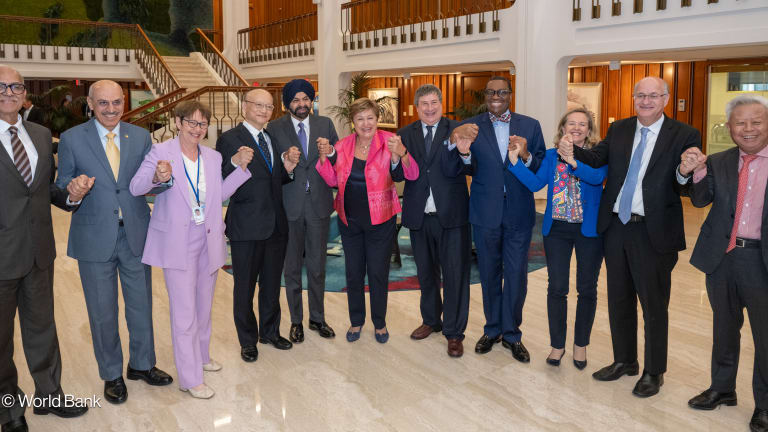
After a year of disrupted learning due to the pandemic, millions of students who took their U.K. advanced level exams received their results in August. These examinations are a crucial assessment in the life of a student: They can determine university and professional options for years to come.
But they have also attracted criticism, as they determine an individual’s fate on the basis of their performance in those few hours when they sit the exam. Indeed, exams do not assess all of what makes a student special — they don’t reflect their values or how they treat others.
Sadly, we treat our economies and societies the same way. Policymakers and economists often measure our well-being using a single metric — gross domestic product — which they treat as an all-encompassing unit to signify national development and societal well being. But GDP measures only the size of a nation’s economy, reflecting a particular performance. It says little about the strength of our society and how we care for the most vulnerable people or the environment.
Over the years, various alternative measures have been developed. These include the genuine progress indicator and the gross national happiness index, which take into account social and ecological variables that are not estimated by GDP.
The policy choices that governments make today will determine their success in the transition to a greener and more inclusive society tomorrow.
—The United Nations Development Programme also worked with governments, academic institutions, and civil society partners to create the Human Development Report and Human Development Index, launched 30 years ago. The index assesses a nation’s progress on three basic dimensions of human development: a long and healthy life, access to knowledge, and a decent standard of living. More recently, a new dimension was added, assessing the sustainability of our use of natural resources.
Some countries have already taken steps to implement a fuller measure and reflection of well-being and development. Maryland and Vermont in the United States officially adopted the GPI, while Bhutan now estimates well-being through a GNH index that considers traditional socioeconomic data as well as non-traditional data such as culture and psychological well-being.
Rwanda has also long recognized that national development is more encompassing than a measurement of per capita income. By placing human well-being at the center of development strategies it has made tremendous progress on health and education, and extended the frontiers of our collective thinking about human progress beyond economic growth. These strategies have included the development of programs from Home-Grown Solutions based on Rwandan cultural practices since the 2000s.
A new assessment of HGSs was released in August 2021 by the UNDP in Rwanda. Its National Human Development Report reviews five of Rwanda’s 13 home-grown solutions that have been in implementation for over a decade: the Umurenge program, which is a social protection program; community-based health insurance; Imihigo for performance contracts; the Girinka program, which allocates one cow to each family; and Umuganda for community work.
Smart data management key to successful vaccine rollouts
Some countries are struggling to roll out the COVID-19 vaccines they have, whereas Rwanda rapidly administered the doses it received. Much of this was due to smart data management.
The UNDP report found that these innovations have contributed to inclusive human development, reducing vulnerability, fostering social cohesion, and enhancing participatory and accountable governance over the past two decades. They have enabled many families to access health care, consume nutritious food, improve educational achievement and literacy, and, in some cases, decrease poverty.
This progress also has been reflected in the HDI. Between 1990 and 2019, as HGSs were implemented, Rwanda’s HDI value increased by 119%, the highest average growth in the world.
Two components of the Umurenge program increased household consumption and lowered poverty rates. A direct support component, which provides monthly cash transfers, increased participants’ consumption by 11% and reduced poverty by 10%. The financial services component increased consumption by 17%.
Over 3,172 classrooms were constructed through the Umuganda program, contributing to the goal of providing nine years of basic education. In turn, Umuganda’s contribution to Rwanda’s economic growth is estimated at more than $127 million from 2007 to 2016.
Q&A: New book puts fresh scrutiny on 'donor darling' Rwanda
In "Do Not Disturb," journalist Michela Wrong explores the development communities' curious relationship to the central African nation.
In 2017 to 2018 alone, more than 3,400 houses were constructed for vulnerable people. Twelve health posts were constructed between 2016 and 2017, bringing health care closer to rural people. Many HGSs have also helped families cope with the hardships of COVID-19, such as through increased access to nutrition and health care — the latter through Rwanda’s unique healthcare insurance program, CBHI, which insures entire households.
Of course, not everything has worked out as planned. Some aspects of the HGSs fell short or even had unintended negative consequences. For example, VUP-Public Works offered short-term employment in public works construction. But analysis showed that the low pay and a limited number of work-days could not generate enough income to sustain people. In fact, it was associated with a 27% decrease in consumption and increased poverty over time.
Such challenges provide opportunities to learn and improve. Whenever we try something new — whether it is a student tackling a challenging new subject or a country implementing a novel program — there will be successes and failures along the way. And it is hard work. It means taking risks, learning from the outcomes, and continuing to progress.
As countries seek to recover from the COVID-19 pandemic, Rwanda’s experiences offer a solid direction and an opportunity to chart a pathway that empowers everyone to face the future with confidence. The policy choices that governments make today will determine their success in the transition to a greener and more inclusive society tomorrow. As with students, it matters that we keep striving to be our best — and that we measure what matters.








